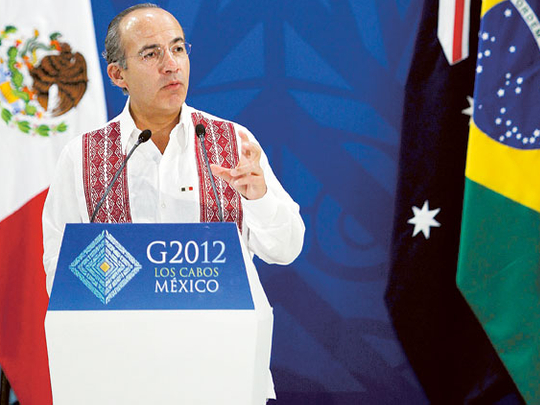
World leaders meeting in Mexico will agree to boost the $430 billion (Dh1.58 trillion) firewall the International Monetary Fund (IMF) announced in April, host President Felipe Calderon said.
“I estimate that there will be a larger capitalisation than the pre-accord reached in Washington, which will be finalised here, but I don’t want to speculate by how much,” Calderon told reporters yesterday in the coastal resort of Los Cabos.
Leaders of the Group of 20 nations are gathering in Los Cabos for a two-day summit beginning Monday that will be dominated by the financial crisis in Europe, which the White House said on June 15 is the key risk to the global economy.
While the G-20 agreed earlier this year to bolster IMF resources that could be channelled to defuse the Euro-area crisis, German Chancellor Angela Merkel last week called on the G-20 to do more.
“I hope there’s a very important agreement about the IMF,” Calderon said. While he said he regrets that the US won’t take part in the IMF recapitalisation, that won’t prevent it being the largest in the fund’s history.
“It’s going to be the first time the fund is capitalised without the US, which reflects the importance of emerging markets,” Calderon said.
Lagarde’s focus
IMF chief Christine Lagarde, who is due to attend the June 18-19 Los Cabos meeting, said earlier this year that she wants to raise the Washington-based fund’s lending capacity by $500 billion to fend off “further shocks” to the global economy. In April, she managed to win commitment for about $430 billion, with key emerging markets such as Brazil and China withholding their specific pledges until progress is made giving them a bigger say in how the lender is run.
Lagarde cancelled a planned trip to Brazil to focus on “ongoing developments in Europe,” the IMF said yesterday in an emailed statement.
Angel Gurria, secretary-general of the Paris-based Organisation for Economic Cooperation and Development, signalled that emerging nations may supply some of the IMF boost.
“Those large emerging countries that are part of the G-20 are now part of the solution,” he told reporters in Los Cabos yesterday, when asked about Calderon’s comments.
Weak economy
The G-20 summit takes place amid the weakest international economy since the 2009 recession and the day after parliamentary elections in Greece. A victory later today for Syriza, an anti-austerity party, may lead Greece to renege on the terms of its bailout and become the first nation to leave the euro currency union, throwing global markets into turmoil.
The global economy is at a “very dangerous moment,” World Bank President Robert Zoellick said in Los Cabos. “If people don’t come to the fundamental decisions, first at a national level, but work it out internationally, very bad things could happen.”
It’s “very difficult to predict” the outcome in Greece, said Calderon, who is himself preparing to step down after July 1 presidential elections.
“My experience is that during campaigns you say a lot of things,” he said, when asked about the prospects of Syriza gaining power. “The key moment we’re only going to know when there’s a government formed.”
In the meantime, Calderon said European governments must work together to strengthen their institutions to prevent damage from spreading to countries like Spain and Italy. The G-20 communique will endorse steps taken by Europe to achieve a closer monetary and fiscal union, he added.
“When your credibility is broken, there’s no system or economy than can sustain itself,” Calderon said, adding that for now Europe doesn’t face such a dire threat. “We still have time, and Europe still has time, to make the right decisions.”












